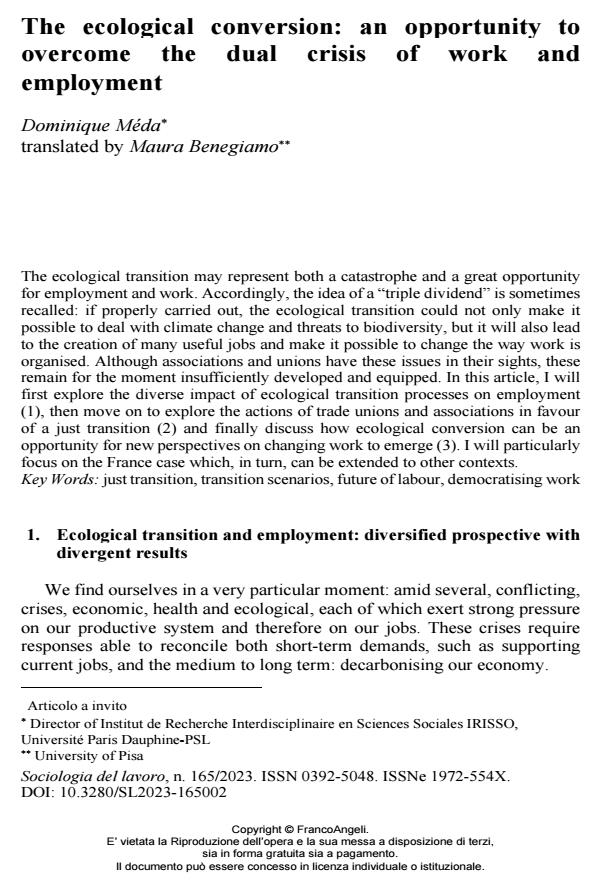The ecological conversion: an opportunity to overcome the dual crisis of work and employment
Titolo Rivista SOCIOLOGIA DEL LAVORO
Autori/Curatori Dominique Méda, Maura Benegiamo
Anno di pubblicazione 2023 Fascicolo 2023/165
Lingua Inglese Numero pagine 16 P. 30-45 Dimensione file 261 KB
DOI 10.3280/SL2023-165002
Il DOI è il codice a barre della proprietà intellettuale: per saperne di più
clicca qui
Qui sotto puoi vedere in anteprima la prima pagina di questo articolo.
Se questo articolo ti interessa, lo puoi acquistare (e scaricare in formato pdf) seguendo le facili indicazioni per acquistare il download credit. Acquista Download Credits per scaricare questo Articolo in formato PDF

FrancoAngeli è membro della Publishers International Linking Association, Inc (PILA), associazione indipendente e non profit per facilitare (attraverso i servizi tecnologici implementati da CrossRef.org) l’accesso degli studiosi ai contenuti digitali nelle pubblicazioni professionali e scientifiche.
The ecological transition may represent both a catastrophe and a great opportunity for employment and work. Accordingly, the idea of a "triple dividend" is sometimes recalled: if properly carried out, the ecological transition could not only make it possible to deal with climate change and threats to biodiversity, but it will also lead to the creation of many useful jobs and make it possible to change the way work is organised. Although associations and unions have these issues in their sights, these remain for the moment insufficiently developed and equipped. In this article, I will first explore the diverse impact of ecological transition processes on employment (1), then move on to explore the actions of trade unions and associations in favour of a just transition (2) and finally discuss how ecological conversion can be an opportunity for new perspectives on changing work to emerge (3). I will particularly focus on the France case which, in turn, can be extended to other contexts. ?�
La transizione ecologica potrebbe rappresentare sia un disastro che una grande opportunità per l’occupazione e il lavoro. Si parla talvolta di un triplo dividendo: se realizzata correttamente, la transizione ecologica potrebbe non solo permettere di affrontare i cambiamenti climatici e le minacce alla biodiversità, ma anche di creare molti posti di lavoro utili e di cambiare l’organizzazione stessa del lavoro. Sebbene le associazioni e i sindacati abbiano in mente questi temi, non sono ancora sufficientemente sviluppati e attrezzati. In questo articolo esplorerò innanzitutto il diverso impatto dei processi di transizione ecologica sull'occupazione (1), per poi passare ad analizzare le azioni di sindacati e associazioni a favore di una giusta transizione (2) discuterò infine di come la conversione ecologica possa essere un'opportunità per far emergere nuove prospettive di cambiamento del lavoro (3). Mi concentrerò in particolare sul caso della Francia che, a sua volta, può essere esteso ad altri contesti.
Parole chiave:transizione giusta, scenari di transizione, futuro del lavoro, democratizzazione del lavoro.
Dominique Méda, Maura Benegiamo, The ecological conversion: an opportunity to overcome the dual crisis of work and employment in "SOCIOLOGIA DEL LAVORO " 165/2023, pp 30-45, DOI: 10.3280/SL2023-165002